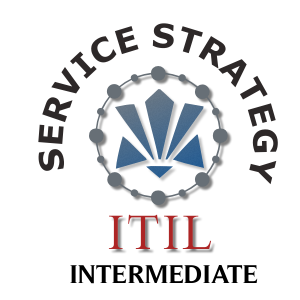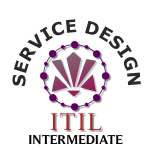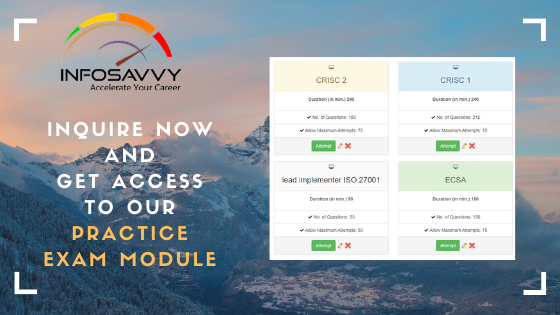The ITIL Intermediate Qualification: Service Strategy Certificate is a free-standing qualification but is also part of the ITIL intermediate lifecycle stream, and one of the modules that leads to the ITIL Expert Certificate in IT Service Management. The purpose of this training module and the associated exam and certificate is, respectively, to impart, test, and validate the knowledge on industry practices in service management and strategy as documented in the ITIL Service Strategy publication.
ITIL Intermediate Service Strategy
Original price was: ₹27,000.00.₹25,000.00Current price is: ₹25,000.00.
- Introduction to service strategy
- Full understanding of service strategy terms and core concepts.
- The purpose, goals and objectives of service strategy
- The scope of service strategy
- The value to the business
- The context of service strategy in relation to all other lifecycle stages.
- Full understanding of service strategy terms and core concepts.
- Service strategy principles
- The knowledge, interpretation and analysis of service strategy principles, techniques and relationships and their application for creation of effective service strategies.
- The ability to decide on a service strategy
- How to utilize the four P’s of service strategy
- How to define services, create value and leverage the combined use of utility and warranty
- How to use service economics and sourcing strategies when meeting business outcomes.
- The knowledge, interpretation and analysis of service strategy principles, techniques and relationships and their application for creation of effective service strategies.
- Service strategy processes
- The knowledge, interpretation and analysis of service strategy principles, techniques and relationships and their application for creation of effective service strategies.
- The management level concepts for the five service strategy processes and how they flow and integrate with the lifecycle
- The purpose, scope and objectives of each service strategy process and how they link to value for the business.
- The knowledge, interpretation and analysis of service strategy principles, techniques and relationships and their application for creation of effective service strategies.
- Governance
- The knowledge, interpretation and analysis of service strategy principles, techniques and relationships and their application for creation of effective service strategies.
- The ability to analyse IT governance and use it to set strategy by leveraging governance frameworks, bodies.
- The knowledge, interpretation and analysis of service strategy principles, techniques and relationships and their application for creation of effective service strategies.
- Organizing for service strategy
- The knowledge, interpretation and analysis of service strategy principles, techniques and relationships and their application for creation of effective service strategies.
- The ability to create an organizational design using the relevant development and departmental methods.
- The knowledge, interpretation and analysis of service strategy principles, techniques and relationships and their application for creation of effective service strategies.
- Technology considerations
- The knowledge, interpretation and analysis of service strategy principles, techniques and relationships and their application for creation of effective service strategies.
- Understand the relevance and opportunities for service automation and the importance and application of technology interfaces across the lifecycle.
- The knowledge, interpretation and analysis of service strategy principles, techniques and relationships and their application for creation of effective service strategies.
- Implementing service strategy
- The knowledge, interpretation and analysis of service strategy principles, techniques and relationships and their application for creation of effective service strategies.
- Develop implementation strategies that follow a lifecycle approach (e.g. design, transition,operation and improvement, programmes).
- The knowledge, interpretation and analysis of service strategy principles, techniques and relationships and their application for creation of effective service strategies.
- Challenges, critical success factors and risks
- The knowledge, interpretation and analysis of service strategy principles, techniques and relationships and their application for creation of effective service strategies.
- The ability to provide insight and guidance for strategic challenges, risks and critical success factors.
- The knowledge, interpretation and analysis of service strategy principles, techniques and relationships and their application for creation of effective service strategies.
• Chief information officers (CIOs)
• Chief technology officers (CTOs)
• Managers
• Supervisory staff
• Team leaders
• Service designers
• IT architects
• IT planners
• IT consultants
• IT audit managers
• IT security managers
Prerequisite Entry Criteria
Candidates wishing to be trained and examined for this qualification must already hold the ITIL Foundation Certificate in IT Service Management which must be presented as documentary evidence to gain admission Candidates who hold the following ITIL qualifications are also eligible, and similar evidence will be required:
• Earlier ITIL (V2) Foundation plus Foundation Bridge
• ITIL Expert Certificate in IT Service Management (achieved via Service Manager or Practitioner bridging routes).
Eligibility for Examination
To be eligible for the ITIL Intermediate Qualification: Service Strategy examination, candidates must have fulfilled the following requirements:
• At least 21 contact hours (hours of instruction, excluding breaks, with an Accredited Training Organization (ATO) or an accredited e-learning solution) for this syllabus, as part of a formal, approved training course/scheme
• A basic IT literacy and around 2 years IT experience are highly desirable
• Hold the ITIL Foundation Certificate in IT Service Management
• It is also recommended that candidates should complete at least 21 hours of personal study by reviewing the syllabus and the ITIL Service Strategy publication in preparation for the examination
Format of the Examination
- Type: Eight (8) multiple choice, scenario-based, gradient-scored questions.
Each question will have 4 possible answer options, one which is worth 5
marks, one which is worth 3 marks, one which is worth 1 mark, and one which
is a distracter and achieves no marks. - Duration Maximum 90 minutes for all candidates in their respective language
Provisions for Additional Time relating to language, Candidates completing an exam in a language that is not their mother tongue have a maximum of 120 minutes to complete the exam and are allowed the use of a dictionary. - Supervised Yes
- Open Book No
- Pass Score 28/40 or 70%
Overview
The ITIL Intermediate Service Strategy Certificate is a free-standing qualification but is also part of the ITIL Intermediate Services Strategy lifecycle stream, and one of the modules that leads to the ITIL Intermediate Service Strategy Expert Certificate in IT Service Management.
The purpose of this training module and the associated exam and certificate is, respectively, to impart, test, and validate the knowledge on industry practices in service management and strategy as documented in the ITIL Service Strategy publication.
Course Outline
- Introduction to service strategy
- Full understanding of service strategy terms and core concepts.
- The purpose, goals and objectives of service strategy
- The scope of service strategy
- The value to the business
- The context of service strategy in relation to all other lifecycle stages.
- Full understanding of service strategy terms and core concepts.
- Service strategy principles
- The knowledge, interpretation and analysis of service strategy principles, techniques and relationships and their application for creation of effective service strategies.
- The ability to decide on a service strategy
- How to utilize the four P’s of service strategy
- How to define services, create value and leverage the combined use of utility and warranty
- How to use service economics and sourcing strategies when meeting business outcomes.
- The knowledge, interpretation and analysis of service strategy principles, techniques and relationships and their application for creation of effective service strategies.
- Service strategy processes
- The knowledge, interpretation and analysis of service strategy principles, techniques and relationships and their application for creation of effective service strategies.
- The management level concepts for the five service strategy processes and how they flow and integrate with the lifecycle
- The purpose, scope and objectives of each service strategy process and how they link to value for the business.
- The knowledge, interpretation and analysis of service strategy principles, techniques and relationships and their application for creation of effective service strategies.
- Governance
- The knowledge, interpretation and analysis of service strategy principles, techniques and relationships and their application for creation of effective service strategies.
- The ability to analyse IT governance and use it to set strategy by leveraging governance frameworks, bodies.
- The knowledge, interpretation and analysis of service strategy principles, techniques and relationships and their application for creation of effective service strategies.
- Organizing for service strategy
- The knowledge, interpretation and analysis of service strategy principles, techniques and relationships and their application for creation of effective service strategies.
- The ability to create an organizational design using the relevant development and departmental methods.
- The knowledge, interpretation and analysis of service strategy principles, techniques and relationships and their application for creation of effective service strategies.
- Technology considerations
- The knowledge, interpretation and analysis of service strategy principles, techniques and relationships and their application for creation of effective service strategies.
- Understand the relevance and opportunities for service automation and the importance and application of technology interfaces across the lifecycle.
- The knowledge, interpretation and analysis of service strategy principles, techniques and relationships and their application for creation of effective service strategies.
- Implementing service strategy
- The knowledge, interpretation and analysis of service strategy principles, techniques and relationships and their application for creation of effective service strategies.
- Develop implementation strategies that follow a lifecycle approach (e.g. design, transition,operation and improvement, programmes).
- The knowledge, interpretation and analysis of service strategy principles, techniques and relationships and their application for creation of effective service strategies.
- Challenges, critical success factors and risks
- The knowledge, interpretation and analysis of service strategy principles, techniques and relationships and their application for creation of effective service strategies.
- The ability to provide insight and guidance for strategic challenges, risks and critical success factors.
- The knowledge, interpretation and analysis of service strategy principles, techniques and relationships and their application for creation of effective service strategies.
Who Should Attend
Chief information officers (CIOs)
• Chief technology officers (CTOs)
• Managers
• Supervisory staff
• Team leaders
• Service designers
• IT architects
• IT planners
• IT consultants
• IT audit managers
• IT security managers
ITIL Foundation https://www.info-savvy.com/product/itil-foundation/
ITIL Intermediate Continual Service Improvement https://www.info-savvy.com/product/itil-intermediate-continual-service-improvement/
You must be logged in to post a review.










Reviews
There are no reviews yet.